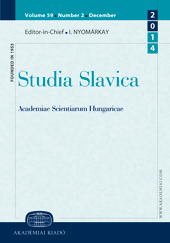Wasserfrauen auf Abwegen: Die Transformation des Rusalka-Motivs in der polnischen und russischen Popkultur
Sirens gone wrong: The transformation of the Rusalka motif into Polish and Russian pop culture
Author(s): Elisabeth Lechner, Stefan Simonek, Marlena TomalaSubject(s): Metaphysics, Semantics, Sociolinguistics, Polish Literature, Russian Literature, Hermeneutics
Published by: Akadémiai Kiadó
Keywords: Rusalka; Russian literature; Russian popular culture; Polish literature; Polish popular culture;
Summary/Abstract: Sirens became an essential element of the literary imagination in many European literatures in Romanticism and have remained popular ever since. Also, in Russian and Polish culture, the image of the dangerously alluring and transgressive female nymph called “rusalka” is omnipresent. In this paper, the authors use a comparative approach to trace the evolution of the “rusalka” motif from its creation in the Romantic period to its transformed (and often highly sexualized) use in present-day popular culture. From works written by Pushkin, Lermontov, Mickiewicz as well as Bal’mont and Gumilev (amongst others), we move on to contemporary actualizations of the motif in the music videos and lyrics of a Russian girl group (“Фабрика”), a Polish pop performer (Doda Elektroda) and a Russian folk-metal band (“Alkonost”). We argue that the centuries-old popularity of the “rusalka” motif can be ascribed to the theme’s core semantics of female transgression and adaptability that lends itself especially well to the sphere of pop and its remixing and resignifying practices.
Journal: Studia Slavica Academiae Scientiarum Hungaricae
- Issue Year: 62/2017
- Issue No: 1
- Page Range: 197-223
- Page Count: 27
- Language: German
- Content File-PDF

